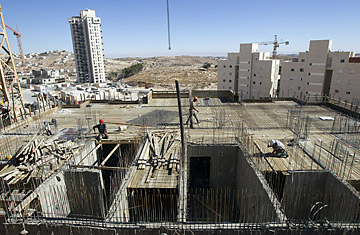
A new housing project at the Israeli settlement of Har Homa, near the West Bank biblical town of Bethlehem, on December 02, 2010.
Israel is worried, according to press reports in the country, that the United States will not "rush to veto" a planned U.N. Security Council resolution condemning ongoing Israeli settlement construction. The resolution is being drafted by Arab countries exasperated by the failure of the U.S. to pressure the Israelis to halt construction in the West Bank and East Jerusalem, which the U.N. deems illegal. The draft may be introduced as early as this week, according to Israeli media, and the Israeli foreign ministry is reportedly mustering a diplomatic full court press to counter the move. While the U.S. has a longstanding tradition of running interference for Israel at the U.N., the Obama Administration may find itself hard-pressed to veto a resolution condemning the same Israeli behavior that Washington itself has publicly deemed illegitimate — and which the Administration has spent months trying in vain to cajole the Israelis into halting.
The Palestinians have insisted, along with the Obama Administration, that Israel refrain from building settlements in occupied territory as a precondition for peace talks. Though the U.S. dropped that effort two weeks ago, the Palestinians continue to press the matter. Prime Minister Benjamin Netanyahu had late last year instituted a 10-month partial moratorium on construction, and talks between the two sides finally got under way in August. But the Palestinians called a halt a month later as Israel's moratorium expired and construction resumed. And the best efforts of the Obama Administration to secure even a temporary reinstatement of the moratorium proved fruitless.
While Washington hopes to make progress by conducting parallel negotiations on substantive issues with both sides, the Palestinians and their Arab allies no longer seem willing to stay on that path and leave the matter in U.S. hands. They saw the settlement freeze demand not only as a test of Israeli intentions — Netanyahu's refusal to stop building outside Israel's 1967 borders has been taken as a sign that he doesn't accept those borders as a basis for Palestinian statehood — but also as a test of the Obama Administration's willingness to press Israel to accept an outcome in keeping with the international consensus on the terms for a two-state solution. Indeed, the Arab League committee with which Palestinian President Mahmoud Abbas consults for his negotiating mandate last Wednesday said there should be no resumption of talks until Washington was ready to publicly commit to the 1967 borders aq the basis for negotiating a two-state solution.
One U.N. option under debate among Arab and Palestinian leaders is to demand U.N. recognition of Palestinian sovereignty in the West Bank, Gaza and East Jerusalem. In recent weeks, Brazil, Argentina and Norway have signaled a willingness to grant such a recognition, and more countries are expected to follow. But even though such a proposal would win near unanimous support at the U.N. and pile on diplomatic pressure, the international body would have no way of implementing Palestinian statehood over Israeli objections.
Still, it would leave Israel internationally isolated, making any Israeli claim on keeping any of its settlements in the West Bank and East Jerusalem contingent on Palestinian agreement. That's why the prospect of the Palestinians going to the U.N. certainly has Israel's supporters in Washington anxious. The House of Representatives last Wednesday urged President Barack Obama to deny recognition to any unilaterally declared Palestinian state, and to veto "any resolution by the United Nations Security Council to establish or recognize a Palestinian state outside of an agreement negotiated by the two parties." But with little prospect for such an agreement in the foreseeable future, the Palestinians and their allies appear to be moving beyond two decades of exclusive reliance on U.S. diplomacy to produce an acceptable outcome.
Moreover, going to the Security Council with a more narrowly focused resolution demanding a halt to settlements, as the Palestinians and their Arab League allies appear set to do first, makes things a lot more difficult for Netanyahu: U.N. Secretary General Ban Ki-Moon recently reiterated that all Israeli construction in the West Bank and East Jerusalem is illegal, and should be immediately halted. Speaking 10 days ago in Washington, Secretary of State Hillary Clinton reiterated that "we do not accept the legitimacy of continued settlement activity." And the argument that the matter of settlements should be left to negotiation between the two sides doesn't hold water, since the very reason it's being referred to the Security Council is that negotiations have reached a dead end.
Yet even if the U.S. doesn't feel it can veto such a resolution, it may be tempted to try and soften the blow — and use the episode to warn Israel of the consequences of its defiance on the settlement issue — by limiting the threats of pressure, or turning the planned resolution into the more nebulous option of a Security Council statement. The response to any such diplomatic maneuvering will certainly be a test of Palestinian and Arab confidence in U.S. diplomacy.
Whatever happens with the Security Council initiative, however, the message is plain: The Palestinian response to the failure of the Obama Administration's peace efforts is unlikely to be, as the Israelis hope, standing passively by or getting on with building up the West Bank's economy and waiting for a better day. Instead, whether in international forums such as the U.N. or on the gritty frontline of Israeli expansion in the West Bank and East Jerusalem — which has prompted small-scale but persistent non-violent protest actions — Palestinians are seeking new forms of leverage. And that, combined with hardening Israeli positions, suggests that a winter of discontent awaits the Holy Land.
